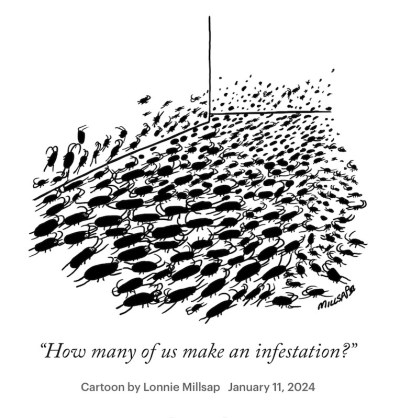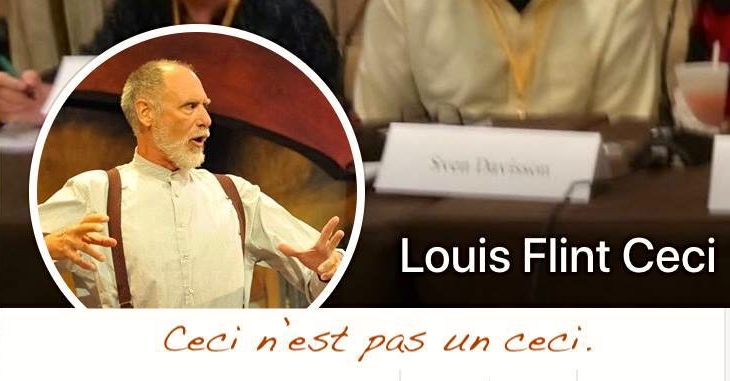Archive for the ‘Paradoxes’ Category
January 21, 2024
Two cockroaches, you have a couple of unpleasant bugs. Undulating masses of cockroaches streaming over all the surfaces in a room, you’ve got a shudder-provoking pest infestation. (I’ve had the latter experience with Argentine ants, and it was the stuff of nightmares for weeks.) But when does the former turn into the latter? This is the question asked by self-aware cockroaches in this cartoon by Lonnie Millsap in the 1/29/24 print-edition New Yorker:

(#1) Cucarachas conscientes de ellas mismas, addressing the puzzle in the sorites paradox / the paradox of the heap
(more…)
Posted in Linguistics in the comics, Paradoxes, Technical and ordinary language, Vagueness | 3 Comments »
November 17, 2023
The new issue of the New Yorker (dated 11/20/23) brings us a Psychiatrist cartoon by Elisabeth McNair, one of a special subtype I’ll call In-Group Psychiatrist (in which a patient from some extraordinary group — a dog, a robot, a squid, what have you, in #1 a book — is being treated by a therapist from that very group):

(#1) You wonder whether the notebook the therapist is writing on is itself preparing to publish its thoughts, and then it’s books all the way down
McNair is new to this blog. So a few words — her own — about her, and then some more cartoons she’s done for the New Yorker, starting with, yes, another In-Group Psychiatrist.
(more…)
Posted in Art, Comic conventions, Language and food, Linguistics in the comics, Paradoxes, Snowclones, Words and things | Leave a Comment »
December 28, 2020
A Boxing Day cartoon by Wayno (with Dan Piraro at Bizarro studios North):

(#1) Wayno’s title:”New Year, New Symbol: Introducing the Pipe of Ambiguity”
Here, this picks out, or points to, the image just above it, which is indeed a symbol. In general, this has no fixed meaning, instead gaining its meaning from the context it’s in.
(more…)
Posted in Books, Context, Linguists, Paradoxes, Pragmatics, Semantics | 6 Comments »
May 2, 2020
No doubt inspired by my 4/29/20 posting “Magritte by Banksy”, Mark Mandel commented yesterday on my 8/19/17 posting “Magrittean disavowals”:
I have never — well, not for many years — considered the “Magrittean disavowal” in “Ceci n’est pas une pipe”
 (#1)
(#1)
at all paradoxical. It’s quite accurate. That is not a pipe, but rather a painting of a pipe.
It’s a shame that the technical term oxymoron has come to be used for a figure of speech involving an apparent contradiction, since etymologically it’s ‘sharp’ + ‘foolish’ and would be just the label we’d want for claims like Mark’s above: superficially clever, but deeply foolish.
(more…)
Posted in Art, Deixis, Metonymy, Paradoxes, Semantics, Words and things | 12 Comments »
April 29, 2020
Noted by Facebook posters recently, this Banksy takeoff on Magritte, photographed here from the side to make its 3-dimensional character clear:

(#1) Banksy’s This is a Pipe (2011), a play on René Magritte’s La Trahison des images (The Betrayal / Treachery of Images: Ceci n’est pas une pipe)

(#2) The Magritte model
(more…)
Posted in Art, Paradoxes, Puns | Leave a Comment »
April 24, 2019
From Jeff Bowles on Facebook on the 12th, this Magritte-based composition:
 (#1)
(#1)
Apparently a Magrittean disavowal (there’s a Page on such disavowals here), playing on Magritte’s wry late 1920s painting La Trahison des images (The Betrayal / Treachery of Images) — which shows a pipe, with the painting labeling itself Ceci n’est pas une pipe ‘This is not a pipe’. Here we get Louis Flint Ceci, on the left, objecting in astonishment that what’s on the right is not (a) Ceci; instead, it’s (a) Davisson.
(more…)
Posted in Art, Books, Gender and sexuality, Homosexuality, Movies and tv, Music, Paradoxes, Poetic form, Poetry, Semantics, Writers | 5 Comments »
May 25, 2018
Via Esha Neogy on the Our Bastard Language Facebook group, this Andertoon:
 (#1)
(#1)
Sentence 1 asserts that some text is grammatically active, but sentence 1 itself is a grammatically passive. Vice versa for sentence 2. Each sentence shows a discordance between a grammatical voice as the topic of a text and the grammatical voice of the sentence about that text. Not actually a contradiction, much less a paradoxical self-contradiction, but a language prank that flirts edgily with these possibilities.
What it is like is the discordance of the Stroop effect, where a color name and the color the name is presented in are at odds, as in this New Yorker cover by the artist Saul Steinberg:
 (#2) In my 6/15/17 posting “For Saul Steinberg”, a discussion of the effect
(#2) In my 6/15/17 posting “For Saul Steinberg”, a discussion of the effect
(more…)
Posted in Linguistics in the comics, Paradoxes, Passive, Philosophy, Psychology, Semantics, Usage advice | Leave a Comment »
April 29, 2018
Steph Shih on Facebook today:
There is this dessert that Darya [Kavitskaya, who is natively Russian, which will eventually become important, but not in this posting] sometimes makes and she calls it a “pie” when really I insist it falls better into the category of a “cake”. So finally today, I drew this.
 (#1) Steph’s objection framed as a Magrittean disavowal (it’s obviously a pie, but… — except that for Steph, it just isn’t a pie)
(#1) Steph’s objection framed as a Magrittean disavowal (it’s obviously a pie, but… — except that for Steph, it just isn’t a pie)
But, as it turns out, it’s not much of a cake either, as most people use that label these days. It looks a lot like a clafoutis, but most of you won’t even know that name — for anything, much less a fruit flan (a term also unknown to most of you). Unlike pie and cake, clafoutis and flan are specialized cooking terms
(more…)
Posted in Art, Categorization and Labeling, Names, Paradoxes, Semantics, Technical and ordinary language | Leave a Comment »










